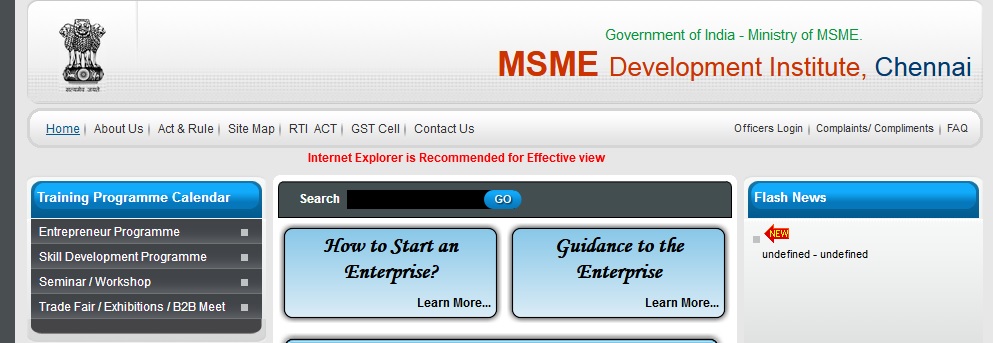msmedi-chennai.gov.in How to Start an Enterprise : MSME Development Institute
Organization : MSME Development Institute
Facility : How to Start an Enterprise
| Want to ask a question / comment on this post? Go to bottom of this page. |
|---|
How to Start an Enterprise : https://msmedi-chennai.gov.in/GARMS_Admin/home.aspx
Home Page :https://msmedi-chennai.gov.in/GARMS_Admin/home.aspx
MSME Steps to Start an Enterprise
STEP-1 :
DECISION TO BE SELF EMPLOYED :
** Economic gains
** From job seeker to job-creator
Related : MSME Entrepreneur Memorandum Filing : www.statusin.in/1082.html
** Sovereign status than a subservient role
** Image of prestige and status
** Inner satisfaction

STEP-2 :
PRODUCT SELECTION :
** Look up for all possible trade publications and secondary data.
** Consult with specialists/ resource persons from MSME-DIs, SSIDC, CSIR, NRDC, DoIs, APCTT etc.
** Extensive use of Internet is also suggested.
** Undertake a market survey for the proposed product/services proposed to be manufactured/ service rendered.
** Assess technology sources, raw materials availability, suppliers of required machinery & equipments. Total investment required for the project, promoter’s contribution need to be estimated. Analyse your personal strengths and weaknesses are other considerations.
** Assess your capacity to invest from own sources and resourcefulness to offer collateral security.
STEP-3 :
PREPARATION OF PRELIMINARY PROJECT REPORT (PPR) :
** Prepare a PPR to get an overall idea regarding the financial requirements namely working capital and fixed capital and total investment
** PPR will serve as a basic document to assess the technical feasibility and financial viability of the project.
** PPR will contain all elements of the project such as requirement of machinery, power, labour and raw materials and profitability estimates.
STEP-4 :
DECIDE ON THE FORM OF OWNERSHIP :
** Sole proprietary
** Partnership
** Co-operative society
** Private limited company
** Public limited company
Understand the merits and de-merits of each form of ownership and their legal requirements and procedures of registrations.
STEP-5 :
LOCATIONIONAL CONSIDERATIONS :
** Nearness to the market
** Easy access to sources of raw materials
** Availability of power
** Availability of skilled Labours locally
** Incentives and facilities offered by Govt
** Transportation
STEP-6 :
PROCUREMENT OF LAND & BUILDINGS :
** Decide on whether to construct buildings/work sheds or to hire them on monthly rent or by long-term leasing
** Check with State industries promotion agencies/corporations, if they could provide land/ ready- built work sheds in the developed industrial estates.
STEP-7 :
PROCUREMENT OF MACHINERY/EQUIPMENTS :
** Identify suppliers of machinery/equipment
** Invite quotations clearly specifying type, size, capacity of each machines. Terms of sale, warranty and guarantee terms and conditions of payment together with technical catalogues and compare them.
** Explore possibilities for obtaining machinery on hire purchase basis under the Schemes of National Small Industries Corporation(NSIC)
STEP-8 :
PREPARATION OF DETAILED PROJECT REPORT :
Detailed project report or bankable project report or business plan is an important document. This should include every minor detail about the project with profitability estimates and projected balance sheet and repayment (of loan) schedules. Cash flow statement, estimate of working capital will also be included.
The other general chapters would contain :
** Introduction
** Demand and market analysis
** Requirement of land, raw materials, machinery, labour, power, finances.
** Be realistic and honest. Let the report not be rosy.
STEP-9 :
FILING OF ENTREPRENEUR MEMORANDUM :
** Part one of EM is synonymous with erstwhile Provisional registration
** Permanent registration or EM Part -II will be done later after the commencement of commercial production.
The District Industries Centre/ Jt. Director of Industries or MSME-DI can be contacted for the purpose. On line EM filing can also be done by the entrepreneur himself/herself.
STEP-10 :
PROCESSING FOR FINANCIAL ASSISTANCE :
Identify credit requirements. Study the schemes operated by various agencies and commercial banks / TIIC. Govt. funded schemes like PMEGP and conditions of assistance must be clearly understood. Approach the appropriate agency with detailed project report. Call on the financier and appraise him about the viability of the project. Submit all relevant documents, as demanded. Arrange for promoters contribution. As loan will be disbursed in instalments, ensure cash flow.
STEP-11 :
OBTAINING STATUTORY LICENSES AND CLEARANCES :
Obtain all necessary clearances/ permits/ registrations and licences, where required from local bodies and statutory organizations.
STEP-12 :
PROCUREMENT OF BASIC INFRASTRUCTURE REQUIREMENTS :
** Procure machinery, install them on the site
** Arrange for power, water and fuel connection
** Recruit personnel, train them
** Procure raw materials
STEP-13 :
TRAIL PRODUCTION :
Conduct trail runs. Review the processing methods and techniques, improve upon them, if scope exists. Perfect and standardise the process.
STEP-14 :
COMMERCIAL PRODUCTION :
Commercial production commences. File Entrepreneurs Memorandum Part II. Process your application for Government Subsidies and incentives. Establish Total Quality Management System. Obtain ISI [BIS] marking, if applicable. Try to be an ISO 9000 certified company.
STEP-15 :
ESTABLISH YOUR MARKET NETWORK :
** Workout a marketing plan, establish distribution network, if needed
** Workout a pricing strategy compatible to the existing market trend
** Workout schemes for sales promotion
STEP-16 :
PERFORMANCE REVIEW :
Review your operations. Review cash flow. Review production performances. Identify problem areas, if any. Correct them instantly. Adhere to the repayment plans, as envisaged in the project report. In case of defaults/ deviations consult your financier. Do not flinch in the face of difficulties.
STEP-17 :
MODERNISATION AND TECHNOLOGY UPGRADATION :
Explore possibilities modenisation and technology upgradation. Remember, improvement and developments are continuous processes.
STEP-18 :
AVOIDING SICKNESS :
Beware of pit falls. Business crises are not unusual. Tackle them with patience and perseverance. Seek expert advice. Take financiers, suppliers and distributors into confidence. Do not hide facts.